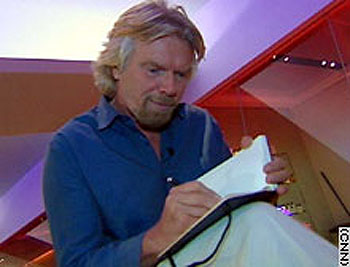What’s the best way to connect on a deeper level? How can you create a connection that’s built on trust faster? Why is listening becoming a lost art?
Earlier this week, I shared how you can help capture the world’s wisdom forever. Today, I remind you how to get better at listening, remind you because many of you are already great listeners.
I spent significant time trying to find someone who would make listening fun again for you. I was given a book earlier this year where Richard Branson shares several great ideas on how to revive the art of great listening.
I’ve been told by several people who know Richard Branson well that he is a great entertainer and entrepreneur, but what really struck them was how they felt heard when he was listening to them.
It’s interesting that in his recent bestselling book, The Virgin Way, he shares a whole chapter on the dying art of listening. He also shares an interesting fact; if you want to be a great leader, it’s more important to be a great listener than a great speaker.
There were three ideas I got from his chapter on listening. The first point Richard makes is listening is not hearing. If you want to listen well, you must learn to focus on the person speaking. He recommends taking notes. Because of his dyslexia, he learned to be a great note taker. Nothing tells a person you are listening to them more than taking notes and capturing the important things being said. These handwritten notes can serve you for a lifetime.
The second point Richard makes is that the smartest, wisest person in the room isn’t always the one who talks the most. He shares than many of the great leaders he’s known are avid, supportive listeners. It’s important to allow the other person to be heard. Many of my best CEO clients are introverts. I believe this is why they are so much better at building great teams around them. You go a lot further for a person who has heard you than you do for one that has directed you. Learning how to bring out the best in others in conversation makes you a brilliant conversationalist. Give the people you listen to the opportunity be heard completely before saying anything.
The third point Richard makes is be careful not to interrupt another to say something you feel is brilliant. How many time have you been talking to someone and you can almost see them explode after you say something. They are so busy thinking of something marvelous to say, they miss your key point. When dealing with all kinds of people it’s is best to listen first, then pausing before jumping in.
Always remember that people process information at different speeds and in different ways. When listening to people who speak several languages its best to allow them the space around what they say. When touching on emotional topics or memories it is critical that you honor their emotions. There is nothing worse than having a person listening to you shrug off a highly personal comment because they didn’t understand the context of the moment.
Several of my tips include how to bring out the best in anyone you’re listening to. Take time to prepare your questions that you need answered. When you ask them, be willing to wait for a great answer. Learn how to support people without saying a word, but provide a deeper listening. If you want to get an extraordinary answer, prepare a great question that gets the person off to great start. It not only shows them respect, but that you thought about what you said before saying it.
Finally, be willing to go out of your own comfort zone to help the other person while listening. I’m not a very touchy person by nature. It’s a joke among family members that I don’t like to be touched by other people. When I interview people or help them during a challenging time I will touch and be touched by others. When people are under extreme stress, a good listener allows their whole body to do the listening, as well. Ever watch a great interviewer talk with someone? They move closer and make the other person seem like the only other person in the room.
If you do these small things, you will not only be thought of as a great listener, but a brilliant conversationalist.
Want to learn more about Richard Branson. You might enjoy Can Entrepreneurs Learn How to Use Stories Like Richard Branson?
See you next week.


One thought on “How Deeper Listening Can Help You Build Trust Faster!”